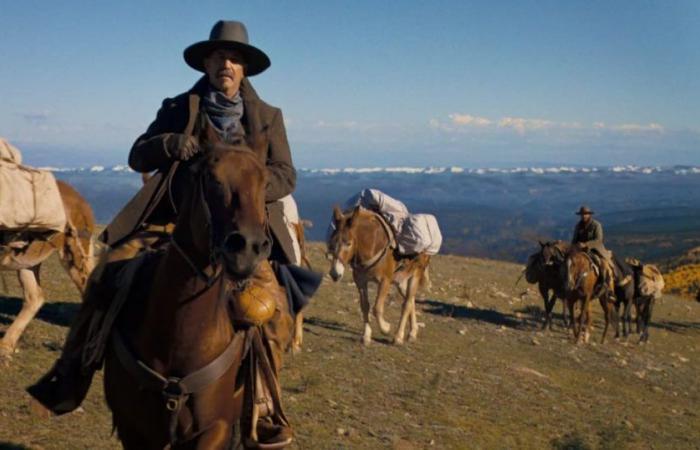“The western is a typical film genre of American cinema that is generally set in the old American West. Western films are set in unexplored or untamed territories, under the latent threat of Indian attack, or in lawless cities where bandits roam freely” can be read in several pocket definitions of the Western. For Andre Bazinone of the great theorists of the history of cinema and its genres, the western is “the cinema par excellence” based on the fact that cinema is movement, but adds that “Neither the horseback riding, the fights, the strong and intrepid men in a landscape of wild austerity are enough to define or specify the charms of the genre.”
The most recent and perhaps most accurate reflection on this genre could be heard in the words of its great master, John Fordalthough transmuted into the skin of David Lynch in the final scene of The Fabelmans: “When the horizon is all the way down, it’s interesting. When it’s all the way up, it’s interesting. When it’s in the middle, it’s boring as hell.”. The most recent of the westerns is written, produced, directed and performed by the man considered the last cowboy in Hollywood – with permission from Clint Eastwood-, Kevin Costner, but it cannot be completely said that he is the most accurate.
Horizon: An American Saga began to gallop in the Cannes Film Festivalwhere he met another film of similar origin such as Megalopolis, namely, the rescued dream of two once acclaimed men who had had to pawn their assets to be able to carry out their respective projects. If the criticism of Francis Ford Coppola’s film was fierce, those of Costner’s film were somewhat more lukewarm, although not much better. With the arrival of the first part of it in theaters one can understand why.
You can also follow us on our whatsapp channel and in Facebook
With a prologue as intended as exciting as it is confusing, in which you can see an excited father and son settling into a new territory – the famous Horizon which gives the film its title and which all the characters will pursue -, the film tries to bring together throughout its three hours everything that the western represents for Costner. That is, its fascinating landscapes, the tension of its pistol duels, the violence of the Indians, the moral ambiguity of the settlers and ultimately the epic of a history, that of the United States of America itself, which would begin to be forged in those years – the film begins in 1859, two years before the outbreak of the Civil War – and which would be forever immortalized in the films of John Ford, Anthony Mann, Raoul Walsh and many other illustrious classic western figures.
Costner tries to recover that greatness at all costs, but it is well known that if you try too hard, you do not do much, and his film suffers from that and much more. In practice, Horizon: An American Saga It has too many plots, too many characters, too many settings and too many dialogues in a genre essentially narrated with images. And the worst thing is that none of them have an apparent connection, at least in this first installment, waiting for everyone to come together in the second, or at least those who remain alive. Because that is another, the number of characters that appear and disappear without there being any type of construction or emotional development behind them. Disputes, reconciliations and murders narrated with grandiloquence and a lot of music that are nothing more than infinite climaxes that happen on the screen.
On the other hand, the classic western has always boasted of having several of the legends of acting. Stars inherent to the genre such as John Wayne either Walter Brennan to other more unusual ones like Barbara Stanwyck Humphrey Bogart either Marilyn Monroepassing through usual outlaws like Henry Fonda, Gary Cooper either James Stewart. In Horizon: An American Saga We have interpreters of greater or lesser experience such as Sam Worthington, Sienna Miller, Luke Wilson, Danny Huston or Jena Malone among others, who seem to have been so strongly urged by Costner to behave like people from the old west that they forget in the process that they are making a movie. There is no chemistry, tension, passion or any other emotion involved whenever any of them interact, just a string of lines that may sound great on paper but lack force when spoken.

The composition of each scene and especially the editing that links them together certainly does not help the performance of any of the actors. In the film, one can go from a savage Indian attack to the introduction of a new character, from an awkward – and not always unintentionally comical – moment in a caravan to a supposedly tragic loss. In its disjointed and clumsy execution of plans It is impossible to know when to laugh and when to cry, when to be excited and when to be afraid of any of the situations that arise. There is no point in shooting a gun in surprise or saving your bullets if the viewer does not even know how important it is or who the targets are.
By the time it reaches its “end”, so to speak, it is nothing more than a abrupt stop on the road To introduce the next episode, rather than frustration or anger, resignation prevails, a sad look at a genre that once made cinema great and whose name is now used in vain. Kevin Costner will have put all his passion and money into his attempt to synthesize more than a hundred years of history and cinema in its almost three hours of footage, but when you finish watching Horizon: An American Saga Ford/Lynch’s words reverberate strongly: this horizon is in the middle.


